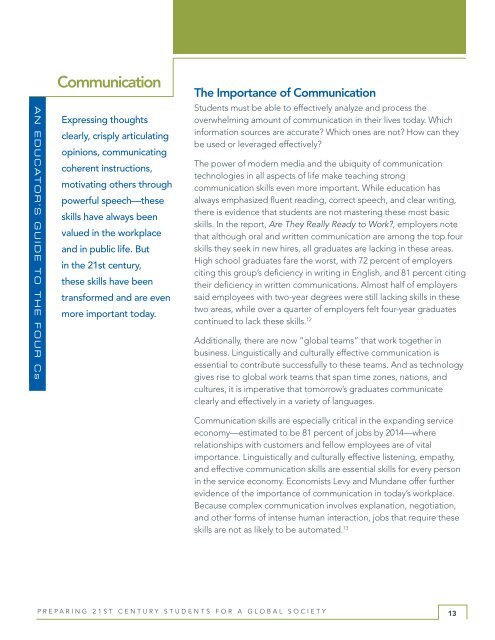Preparing 21st Century Students for a Global Society
Preparing 21st Century Students for a Global Society
Preparing 21st Century Students for a Global Society
Create successful ePaper yourself
Turn your PDF publications into a flip-book with our unique Google optimized e-Paper software.
A n E d u c At o r ’ s G u i d E t o t h E F o u r c s<br />
Communication<br />
Expressing thoughts<br />
clearly, crisply articulating<br />
opinions, communicating<br />
coherent instructions,<br />
motivating others through<br />
powerful speech—these<br />
skills have always been<br />
valued in the workplace<br />
and in public life. But<br />
in the <strong>21st</strong> century,<br />
these skills have been<br />
trans<strong>for</strong>med and are even<br />
more important today.<br />
The Importance of Communication<br />
P r e P a r i n g 2 1 s t C e n t u r y s t u d e n t s f o r a g l o b a l s o C i e t y<br />
<strong>Students</strong> must be able to effectively analyze and process the<br />
overwhelming amount of communication in their lives today. Which<br />
in<strong>for</strong>mation sources are accurate? Which ones are not? How can they<br />
be used or leveraged effectively?<br />
The power of modern media and the ubiquity of communication<br />
technologies in all aspects of life make teaching strong<br />
communication skills even more important. While education has<br />
always emphasized fluent reading, correct speech, and clear writing,<br />
there is evidence that students are not mastering these most basic<br />
skills. In the report, Are They Really Ready to Work?, employers note<br />
that although oral and written communication are among the top four<br />
skills they seek in new hires, all graduates are lacking in these areas.<br />
High school graduates fare the worst, with 72 percent of employers<br />
citing this group’s deficiency in writing in English, and 81 percent citing<br />
their deficiency in written communications. Almost half of employers<br />
said employees with two-year degrees were still lacking skills in these<br />
two areas, while over a quarter of employers felt four-year graduates<br />
continued to lack these skills. 12<br />
Additionally, there are now “global teams” that work together in<br />
business. Linguistically and culturally effective communication is<br />
essential to contribute successfully to these teams. And as technology<br />
gives rise to global work teams that span time zones, nations, and<br />
cultures, it is imperative that tomorrow’s graduates communicate<br />
clearly and effectively in a variety of languages.<br />
Communication skills are especially critical in the expanding service<br />
economy—estimated to be 81 percent of jobs by 2014—where<br />
relationships with customers and fellow employees are of vital<br />
importance. Linguistically and culturally effective listening, empathy,<br />
and effective communication skills are essential skills <strong>for</strong> every person<br />
in the service economy. Economists Levy and Mundane offer further<br />
evidence of the importance of communication in today’s workplace.<br />
Because complex communication involves explanation, negotiation,<br />
and other <strong>for</strong>ms of intense human interaction, jobs that require these<br />
skills are not as likely to be automated. 13<br />
13


